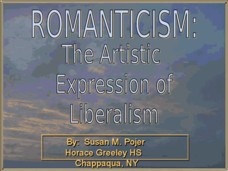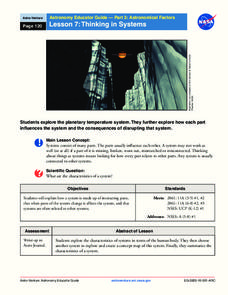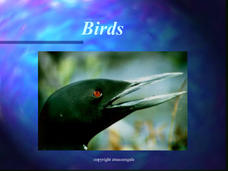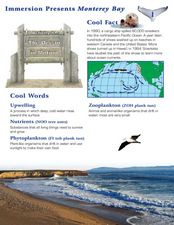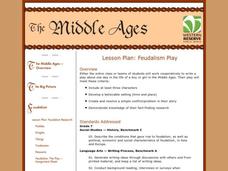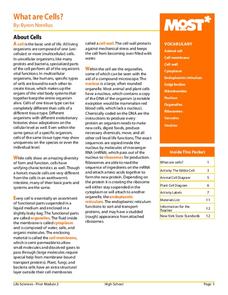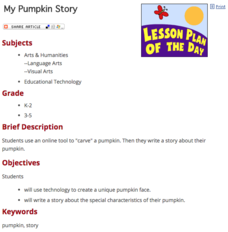Curated OER
Romanticism: The Artistic Expression of Liberalism
The epic clash of reason and emotion comes to life in this informative presentation. Detailing the period of Romanticism in 19th century Europe, these slides contain pictures of the most famous pieces of art during this period. Viewers...
Virginia Department of Education
Mendelian Genetics
How did Mendel know which pea plants would demonstrate certain characteristics? Pupils explore the answer this question, among others, as they complete Punnet squares, research dominant and recessive traits, and explore hereditary...
NASA
Astronomy Mission Module
Yes, scientists say, there is other life in our solar system! And the best place to look is on Europa, a moon of Jupiter. Here, learners mimic the techniques scientists use to gather information about objects in our solar system, write...
Biology Junction
Introduction to Biology
Welcome to Biology! Introduce pupils to a subject conceptualized by Aristotle in 300 BC through a presentation and worksheet. It covers the themes of biology, characteristics of life, the scientific method, microscopes, and measurements.
Biology Junction
Mollusks
Mollusks created every shell on Earth. Young scientists learn more about the phyllum mollusca in an informative presentation. It covers their characteristics, body plans, and relationships in the ecosystem. Then, it details each class of...
Biology Junction
Birds
Birds adapted to almost every climate on the planet, from the Arctic to the rain forests. A presentation focused on birds covers their similarities and differences. It starts with their evolution from reptiles, their many physical...
Curated OER
Monterey Bay
Students read background information about Monterey Bay, California, and conduct related experiments. In this ocean in motion instructional activity, students read information about the location, wildlife, and characteristics of Monterey...
NET Foundation for Television
1850-1874 Notable Nebraskan: J. Sterling Morton
What are the characteristics of an outstanding citizen? Nebraskan J. Sterling Morton contributed to the formation of societal and family values in his state. Learners gather information on Morton's life accomplishments from primary...
Curated OER
The Very Hungry Caterpillar
Here is a good lesson plan on butterflies and caterpillars. After listening to The Very Hungry Caterpillar, young learners put cards that depict the life cycle of a butterfly in the correct order. There are some good ideas for center...
Scholastic
Biographical History
Elementary learners study and research an important historical figure. They research a historical figure and use a four square organizer to take notes. They develop a timeline and poem that reflects the life of the historical figure....
Curated OER
Blue Crabs - The Blue Crab's Chesapeake Journey
A plethora of information about the blue crabs of Chesapeake Bay will amaze and delight your marine biologists. They learn, through direct instruction, about the characteristics and life cycle of this fascinating arthropod. A highlight...
Sargent Art
Picasso and Beyond!
After reviewing the life and art of Pablo Picasso, learners set out to create abstract, cubist, relief portraits. They'll draw, color, paint, and cut out portraits just like the ones Picasso created. The lesson is extremely well written...
Northeastern Educational Television of Ohio, Inc.
Feudalism Play
Using research notes on feudal roles in medieval Europe, learners work cooperatively to write a play about one day in the life of a boy or girl in the Middle Ages.
Curated OER
What Are Cells?
Energize the cells of young biologists with an edible life science activity. Engaging learners in exploring the inner workings of plant and animal cells, this activity involves using colored jello and various sweet and...
Curated OER
Steer Clear of Trouble
Inform teenagers about safe driving techniques. Young journalists use the Internet to investigate safe driving practices and technologies then publish a manual for the teen drivers in their life.
Curated OER
Human Evolution: Biology, Bones
Learners will love a weeks worth of bone study. They use bones and characteristics of bones to explore the evolution of hominoids. Bones are compared, categorized, and considered. A great way to bring physical anthropology and material...
Curated OER
Stream Scanners
Students investigate quality of water in a stream, lake, or pond by examining chemical, physical, and biological characteristics.
Curated OER
Earth's Heavenly Treasures: Hummingbirds
Young ornithologists watch an informative video and use the Internet to gather data about the life, size, habitat, and migration of hummingbirds. The interdisciplinary lesson includes activities that target art, science, math, and...
Curated OER
Fate vs. Mind: A Macedonian Folk Tale
High schoolers read examples of folk tales and describe the characteristics of fables and folk tales. They also examine the concept of fate and if it plays a part in people's lives.
Ocean Explorer
Architects of the Coral Reef
Coral Reefs are the focus of a life science lesson plan. Upper graders look at how coral reefs are formed, how the animals and plants reproduce, and the variety of ways that humans benefit from coral reefs around the world. Groups of...
Education World
My Pumpkin Story
Have young pumpkin carvers use technology to create a unique pumpkin face and write a short story about the special characteristics of their pumpkin.
Curated OER
Student Reading - The Unique Properties of Water
Without water there would be no life on this planet. Biology learners find out why by reading this handout. Create a worksheet of questions to answer after the reading. Follow it up with quick demonstrations or laboratory activities that...
Curated OER
Invetories Slave owner or not?
Primary source analysis is a great way to bring history to life. Learners examine a series of personal inventories taken from Southern white males who died during the Civil War era. They analyze the documents to determine the social and...
Curated OER
Help the Duck Find Her Babies
Students are introduced to a basic characteristic and need of living things-the ability and need to reproduce. They investigate how birds (and people) attract mates. Students discover how to build a nest. They discuss the needs and...
Other popular searches
- 6 Characteristics of Life
- 7 Characteristics of Life
- The Characteristics of Life
- Characteristics of Life Labs
- Life Characteristics
- Life Characteristics Biology
- Basic Characteristics of Life


